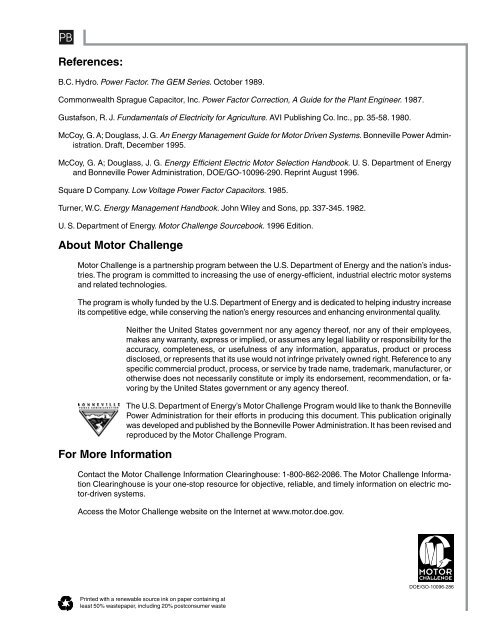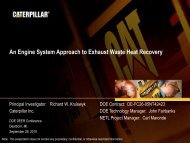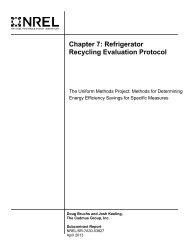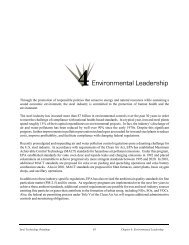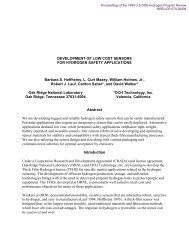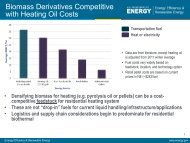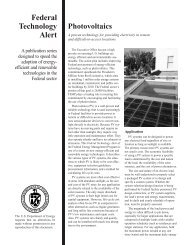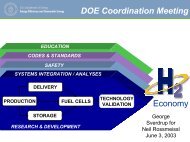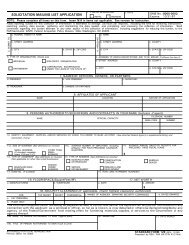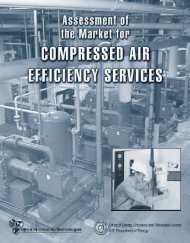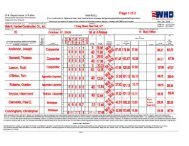Reducing Power Factor Cost - EERE - U.S. Department of Energy
Reducing Power Factor Cost - EERE - U.S. Department of Energy
Reducing Power Factor Cost - EERE - U.S. Department of Energy
You also want an ePaper? Increase the reach of your titles
YUMPU automatically turns print PDFs into web optimized ePapers that Google loves.
PB<br />
References:<br />
B.C. Hydro. <strong>Power</strong> <strong>Factor</strong>. The GEM Series. October 1989.<br />
Commonwealth Sprague Capacitor, Inc. <strong>Power</strong> <strong>Factor</strong> Correction, A Guide for the Plant Engineer. 1987.<br />
Gustafson, R. J. Fundamentals <strong>of</strong> Electricity for Agriculture. AVI Publishing Co. Inc., pp. 35-58. 1980.<br />
McCoy, G. A; Douglass, J. G. An <strong>Energy</strong> Management Guide for Motor Driven Systems. Bonneville <strong>Power</strong> Administration.<br />
Draft, December 1995.<br />
McCoy, G. A; Douglass, J. G. <strong>Energy</strong> Efficient Electric Motor Selection Handbook. U. S. <strong>Department</strong> <strong>of</strong> <strong>Energy</strong><br />
and Bonneville <strong>Power</strong> Administration, DOE/GO-10096-290. Reprint August 1996.<br />
Square D Company. Low Voltage <strong>Power</strong> <strong>Factor</strong> Capacitors. 1985.<br />
Turner, W.C. <strong>Energy</strong> Management Handbook. John Wiley and Sons, pp. 337-345. 1982.<br />
U. S. <strong>Department</strong> <strong>of</strong> <strong>Energy</strong>. Motor Challenge Sourcebook. 1996 Edition.<br />
About Motor Challenge<br />
Motor Challenge is a partnership program between the U.S. <strong>Department</strong> <strong>of</strong> <strong>Energy</strong> and the nation’s industries.<br />
The program is committed to increasing the use <strong>of</strong> energy-efficient, industrial electric motor systems<br />
and related technologies.<br />
The program is wholly funded by the U.S. <strong>Department</strong> <strong>of</strong> <strong>Energy</strong> and is dedicated to helping industry increase<br />
its competitive edge, while conserving the nation’s energy resources and enhancing environmental quality.<br />
For More Information<br />
Neither the United States government nor any agency there<strong>of</strong>, nor any <strong>of</strong> their employees,<br />
makes any warranty, express or implied, or assumes any legal liability or responsibility for the<br />
accuracy, completeness, or usefulness <strong>of</strong> any information, apparatus, product or process<br />
disclosed, or represents that its use would not infringe privately owned right. Reference to any<br />
specific commercial product, process, or service by trade name, trademark, manufacturer, or<br />
otherwise does not necessarily constitute or imply its endorsement, recommendation, or favoring<br />
by the United States government or any agency there<strong>of</strong>.<br />
The U.S. <strong>Department</strong> <strong>of</strong> <strong>Energy</strong>’s Motor Challenge Program would like to thank the Bonneville<br />
<strong>Power</strong> Administration for their efforts in producing this document. This publication originally<br />
was developed and published by the Bonneville <strong>Power</strong> Administration. It has been revised and<br />
reproduced by the Motor Challenge Program.<br />
Contact the Motor Challenge Information Clearinghouse: 1-800-862-2086. The Motor Challenge Information<br />
Clearinghouse is your one-stop resource for objective, reliable, and timely information on electric motor-driven<br />
systems.<br />
Access the Motor Challenge website on the Internet at www.motor.doe.gov.<br />
Printed with a renewable source ink on paper containing at<br />
least 50% wastepaper, including 20% postconsumer waste<br />
DOE/GO-10096-286


